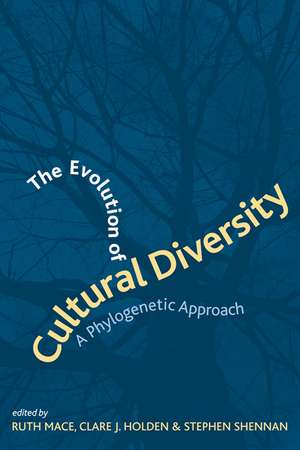The Evolution of Cultural Diversity: A Phylogenetic Approach: UCL Institute of Archaeology Publications
Editat de Ruth Mace, Clare J Holden, Stephen Shennanen Limba Engleză Paperback – 31 mai 2005
Din seria UCL Institute of Archaeology Publications
- 18%
 Preț: 782.44 lei
Preț: 782.44 lei -
 Preț: 413.33 lei
Preț: 413.33 lei -
 Preț: 312.56 lei
Preț: 312.56 lei -
 Preț: 288.80 lei
Preț: 288.80 lei -
 Preț: 356.44 lei
Preț: 356.44 lei - 12%
 Preț: 340.69 lei
Preț: 340.69 lei -
 Preț: 502.75 lei
Preț: 502.75 lei - 31%
 Preț: 765.68 lei
Preț: 765.68 lei - 16%
 Preț: 245.83 lei
Preț: 245.83 lei -
 Preț: 352.41 lei
Preț: 352.41 lei -
 Preț: 349.80 lei
Preț: 349.80 lei - 25%
 Preț: 1022.48 lei
Preț: 1022.48 lei -
 Preț: 386.31 lei
Preț: 386.31 lei -
 Preț: 414.53 lei
Preț: 414.53 lei - 25%
 Preț: 1005.92 lei
Preț: 1005.92 lei -
 Preț: 370.87 lei
Preț: 370.87 lei -
 Preț: 384.02 lei
Preț: 384.02 lei - 15%
 Preț: 582.24 lei
Preț: 582.24 lei -
 Preț: 368.76 lei
Preț: 368.76 lei -
 Preț: 346.71 lei
Preț: 346.71 lei - 17%
 Preț: 240.42 lei
Preț: 240.42 lei - 15%
 Preț: 249.80 lei
Preț: 249.80 lei - 26%
 Preț: 1044.60 lei
Preț: 1044.60 lei - 18%
 Preț: 782.44 lei
Preț: 782.44 lei - 29%
 Preț: 1020.09 lei
Preț: 1020.09 lei - 21%
 Preț: 364.86 lei
Preț: 364.86 lei -
 Preț: 349.71 lei
Preț: 349.71 lei - 15%
 Preț: 669.94 lei
Preț: 669.94 lei - 18%
 Preț: 1128.91 lei
Preț: 1128.91 lei - 18%
 Preț: 1082.83 lei
Preț: 1082.83 lei -
 Preț: 389.66 lei
Preț: 389.66 lei -
 Preț: 354.71 lei
Preț: 354.71 lei - 19%
 Preț: 241.15 lei
Preț: 241.15 lei - 16%
 Preț: 264.12 lei
Preț: 264.12 lei - 17%
 Preț: 246.84 lei
Preț: 246.84 lei - 26%
 Preț: 1014.74 lei
Preț: 1014.74 lei -
 Preț: 349.80 lei
Preț: 349.80 lei
Preț: 247.40 lei
Preț vechi: 296.34 lei
-17% Nou
Puncte Express: 371
Preț estimativ în valută:
47.34€ • 49.55$ • 39.40£
47.34€ • 49.55$ • 39.40£
Carte tipărită la comandă
Livrare economică 31 martie-14 aprilie
Preluare comenzi: 021 569.72.76
Specificații
ISBN-13: 9781598742169
ISBN-10: 1598742167
Pagini: 301
Dimensiuni: 152 x 229 x 20 mm
Greutate: 0.45 kg
Ediția:1
Editura: Taylor & Francis
Colecția Routledge
Seria UCL Institute of Archaeology Publications
Locul publicării:Oxford, United Kingdom
ISBN-10: 1598742167
Pagini: 301
Dimensiuni: 152 x 229 x 20 mm
Greutate: 0.45 kg
Ediția:1
Editura: Taylor & Francis
Colecția Routledge
Seria UCL Institute of Archaeology Publications
Locul publicării:Oxford, United Kingdom
Cuprins
Chapter 1 Introduction, RuthMace; Part 1 Part I; Chapter 2 Introduction to Part i how Tree-Like is Cultural Evolution?, ClareJ Holden, ShennanStephen; Chapter 3 Testing Population Dispersal Hypotheses, J GreenhillSimon, D GrayRussell; Chapter 4 Comparison of Maximum Parsimony and Bayesian Bantu Language Trees, J HoldenClare, MeadeAndrew, PagelMark; Chapter 5 Untangling Our Past, BryantDavid, FilimonFlavia, D GrayRussell; Chapter 6 Cultural Phylogenetic Hypotheses in Archaeology, J O’BrienMichael, LymanR Lee; Chapter 7 Phylogenesis Versus Ethnogenesis in Turkmen Cultural Evolution, CollardMark, TehraniJamshid; Chapter 8 Investigating Processes of Cultural Evolution on the North Coast of New Guinea With Multivariate and Cladistic Analyses, ShennanStephen, CollardMark; Chapter 9 Cultural Transmission in Indigenous California, JordanPeter, ShennanStephen; Part 2 Part II; Chapter 10 Introduction to Part II on The Use of Phylogenetic Comparative Methods to Test Co-Evolutionary Hypotheses Across Cultures, RuthMace; Chapter 11 The Evolution of Human Sex Ratio at Birth, RuthMace, FionaJordan; Chapter 12 ‘The Cow is the Enemy of Matriliny’, J HoldenClare, MaceRuth; Chapter 13 Bayesian Estimation of Correlated Evolution Across Cultures, PagelMark, Meade Andrew;
Notă biografică
Ruth Mace, Clare J Holden, Stephen Shennan
Descriere
This volume tackles questions of cultural evolution empirically and quantitatively, using a range of case studies from Africa, the Pacific, Europe, Asia and America. Powerful theoretical tools developed in evolutionary biology are used to test detailed hypotheses about historical patterns and adaptive functions in cultural evolution.
